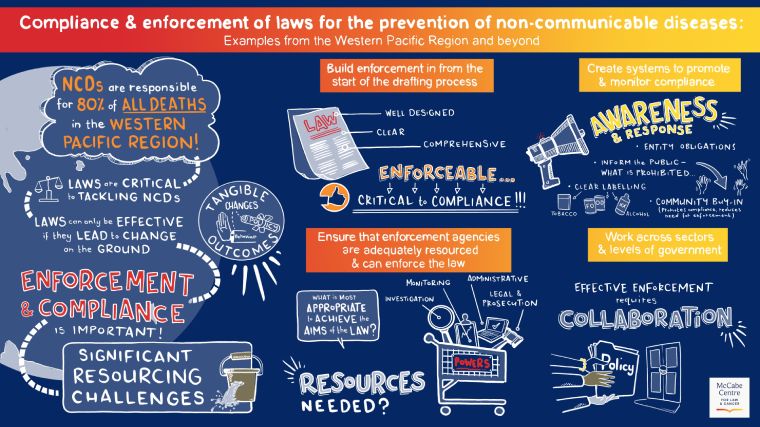
We know that law is one of the most effective and powerful tools in preventing noncommunicable disease – but laws can only be effective if they lead to change on the ground.
Ensuring the success of well-drafted and robust laws means building in mechanisms from the very beginning to ensure they’re able to be enforced, and to encourage compliance.
Knowing where to start when it comes to building in systems of monitoring, compliance and enforcement can be daunting. That’s why we have worked with the World Health Organization in the Western Pacific Region to compile this report, which brings together examples of good practices from the region and elsewhere.
From no smoking zones to nutrition labelling and sale of alcohol laws, there are instances throughout the region where good enforcement strategies have led to tangible outcomes for communities.
McCabe Centre for Law and Cancer Director, Hayley Jones, said the report drew on a wide range of experiences and contexts.
“In this report we’ve gathered practical and diverse examples where governments, authorities and communities have collaborated and worked together right across the Western Pacific Region and beyond.”
“What the report has demonstrated is that turning laws into action can be a long process, and compliance and enforcement are incredibly important in that process.
“Compliance, enforcement, and monitoring cannot just be an afterthought.”
The report looks at all components of building monitoring and enforcement systems, including drafting laws, transitional periods for dealing with change, securing community, political and administrative buy-in, as well as how to promote and monitor compliance, complaints systems and responding to violations. It also focuses on multisectoral coordination for enforcement, and resourcing, monitoring and evaluation.
This report is part of the McCabe Centre’s activities as the WHO Collaborating Centre on Law and Noncommunicable disease, and was compiled with the assistance of our alumni networks, the WHO, the Pacific Community (SPC), and their respective member states.
You can read the report here .